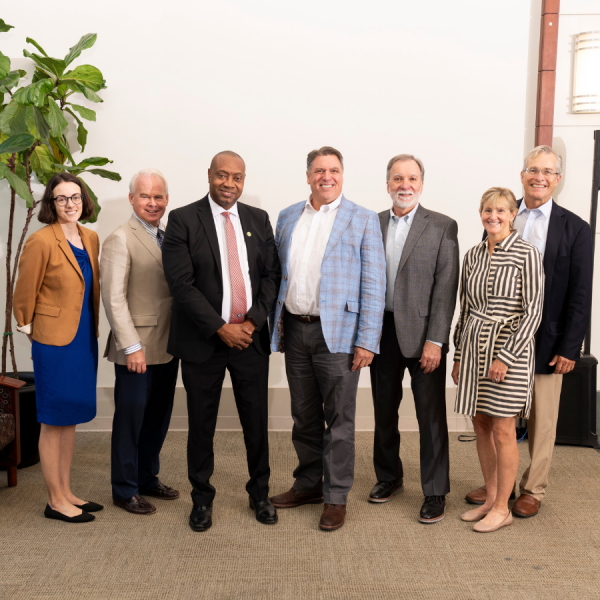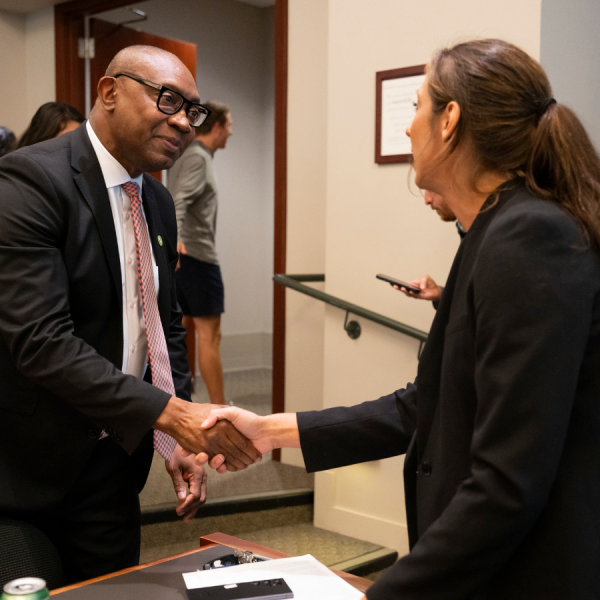While climate change can be a polarizing topic, many Americans—regardless of political beliefs—recognize through science and lived experience that the threat of a warming planet is real and worsening. The main challenge is how to effectively mitigate the impacts through lasting policy changes and proactive governance.
Vanderbilt Law School’s Energy, Environment & Land Use (EELU) Program hosted Dr. J Marshall Shepherd for the 2024 Distinguished Lecture on Climate Change Governance. The event was presented by EELU Faculty Co-Directors Michael P. Vandenbergh and J.B. Ruhl and made possible by the Sally Shellenberger Brown EELU Fund.

Dr. Shepherd, Georgia Athletic Association Distinguished Professor and Director of the Atmospheric Sciences Program at the University of Georgia, is a leading scientist and meteorologist known for his pioneering work in weather and climate science, including 12 years at NASA as Deputy Project Scientist for the Global Precipitation Measurement mission. He received the 2004 Presidential Early Career Award from President W. George Bush and was elected to the National Academy of Sciences in 2021. Dr. Shepherd hosts “Weather Geeks” on The Weather Channel and regularly contributes to Forbes, The Today Show, CBS Face The Nation, and other major media outlets.
Scientific Foundation for Climate Change
Dr. Shepherd opened with scientific context for the legal and political debates surrounding climate change. He asserted the indisputable reality of climate change, providing scientific data that illustrated the increasing temperatures over the past two decades. “2023 was the warmest year on record globally,” he began, “and it’s pretty clear that 2024 is one to challenge for that.”
Additionally, Dr. Shepherd argued the importance of the greenhouse effect: “ If we did not have the greenhouse effect, we would have frozen to death last night… but it’s somewhat out of balance now with the increased greenhouse gasses and so forth.” He highlighted the extreme heat patterns in the Desert Southwest, where temperatures have exceeded 100 degrees Fahrenheit for 100 consecutive days. However, what he finds more alarming were the 90 degree temperatures at 2 am.
“We can’t regulate the temperature in the body, and the temperatures aren’t adjusting downward at night,” he explained. ”In a naturally varying climate system, we should have about an equal number of record high temperatures that are given here as we do record low temperatures. We’re not getting the record low temperatures anymore, just the highest.”
Climate Governance and Economic Impact
Climate change is an environmental and economic issue, one that impacts governance at all levels. “We are seeing an increasing trend in the number of billion-dollar disasters across all spaces,” he noted. Dr. Shepherd acknowledged that not all billion-dollar disasters are due to climate change — “we are building more things that are in the way of hurricanes and tornadoes and floods.” He views an objective approach to climate change as crucial to successful communication across the political spectrum. “It’s important to lay out the caveats in an objective way and without the hyperbole,” he said.
He also spoke to the economic costs of climate change, presenting a satellite image of Hurricane Ida making landfall on the Gulf of Mexico in 2021. “[This photo] shows a natural geophysical hazard,” he explained, pointing to the innumerous yellow specks illustrating lights, “it really juxtaposes the risk of this event on people and infrastructure.” He also presented an image of a flooded community in Louisiana. “This is a look at the fiscal risk of climate change,” Dr. Shepherd stated, explaining that the damages to infrastructure result in “expenditure impacts that ultimately lead to net negative impacts on the public budget.”
Socioeconomic Security and Infrastructure Vulnerability
He stressed the importance of assessing the intersection of climate change risks, societal vulnerability, and governance. “When I think about risk, I think about it from the standpoint of the hazard—whether that’s a flood, or hurricane, or a tornado, or heat wave, the exposure to that hazard, and who’s vulnerable to that,” he explained. “Then, the denominator is resilience: Who has the ability to or what infrastructure can withstand and bounce back from that risk?”
This equation allows scientists and policymakers to identify how socioeconomic factors and infrastructure vulnerability intersect with climate risks, particularly affecting marginalized communities. Dr. Shepherd highlighted that areas in the southeastern U.S. “are some of the poorest counties in the nation, and socioeconomic status is a direct marker of vulnerability.” He then discussed compounding and cascading impacts. “Hurricane Beryl made landfall in Houston and didn’t really cause much of a problem initially like a hurricane would expect. But with the power out while Houston was in the midst of an extreme heat wave, that’s a challenge,” he said.
The Need for Intellectual Convergence
Dr. Shepherd explained that climate change is not just a scientific or environmental issue but also one of public health, economics, social justice, and governance. “It is irresponsible to approach some of the wicked and pressing challenges of the day from our narrow academic silo,” he argued. “We have to converge in our approaches to challenges like this… so as we think about approaching policy, engaging with policymakers, and affecting the change of policy, we have to talk from various lenses that make sense.”
Citing examples of climate change’s impacts, ranging from food security to global supply chains, Dr. Shepherd made it clear that no single field could wholly solve these issues alone.
Proactive Governance

Dr. Shepherd advocated for a shift from reactive to proactive governance strategies. Taking action only after disasters occur has become inadequate and financially inefficient due to increasingly frequent and severe climate events. Dr. Shepherd cited his colleague Ian Giammanco, who said that “being proactive with resilience has shown even a 10 to 1 return on reducing losses for catastrophic events.”
“We cannot afford to continue throwing billions at disasters when we could be investing in prevention,” he cautioned. “A dollar spent on mitigation can save six dollars in recovery costs.”
Challenges for Moving Forward
Dr. Shepherd concluded his lecture by acknowledging the obstacles that lie ahead. He identified “climate delay-ism” as a significant barrier to progress in the climate governance space. The phenomenon occurs when leaders acknowledge climate change but delay the implementation of solutions due to political and economic concerns. Dr. Shepherd explained that while many policymakers accept the reality of climate change, “the debate now shifts to the economic viability of different solution spaces,” thus forming a barrier to action.
He also stressed the issue of misinformation. When discussing data on U.S. public opinions on climate change, Dr. Shepherd stated that “the ‘dismissive’ is at around 11%… so that means 89% of the American public is not dismissive.” He added that “the challenge is that the 11% is really loud on social media,” skewing conversations and public perceptions of climate change.
In his conclusion, he highlighted the misalignment between political cycles and climate change. “Conditions that create the disaster impacts that I’ve described occur over decades or centuries, while governance responses to these impacts are asked to be created in far less time in order to be effective,” he explained. This “mismatch in timescale” creates its own set of challenges for implementing proactive and long-term solutions to climate change issues.
Watch the full lecture below or on our YouTube: